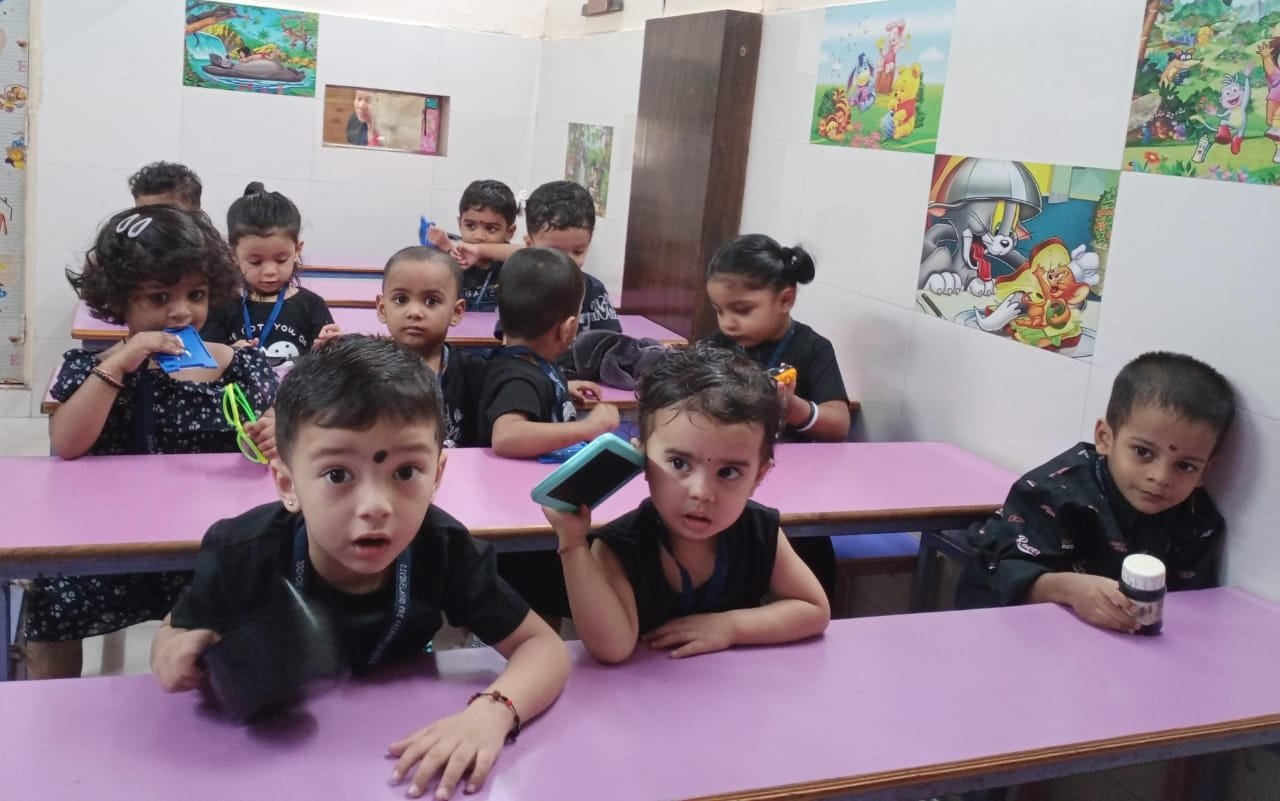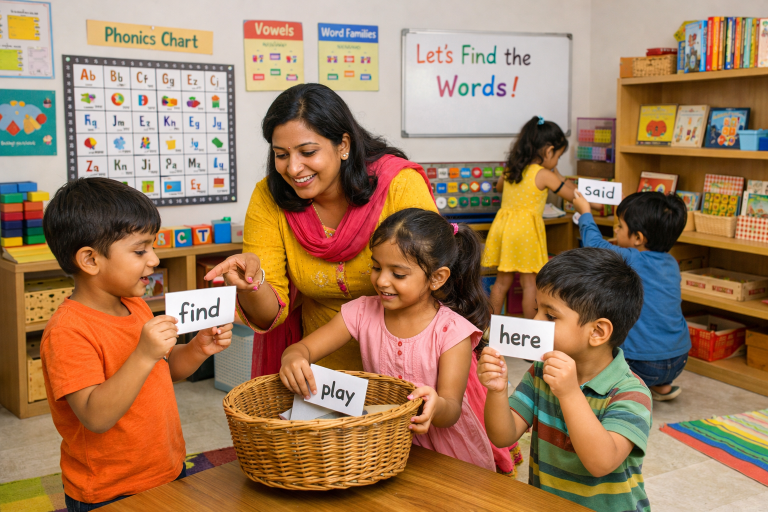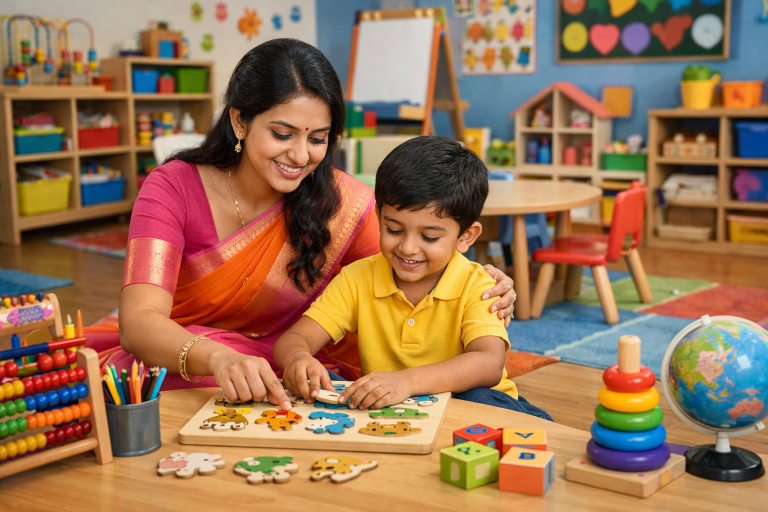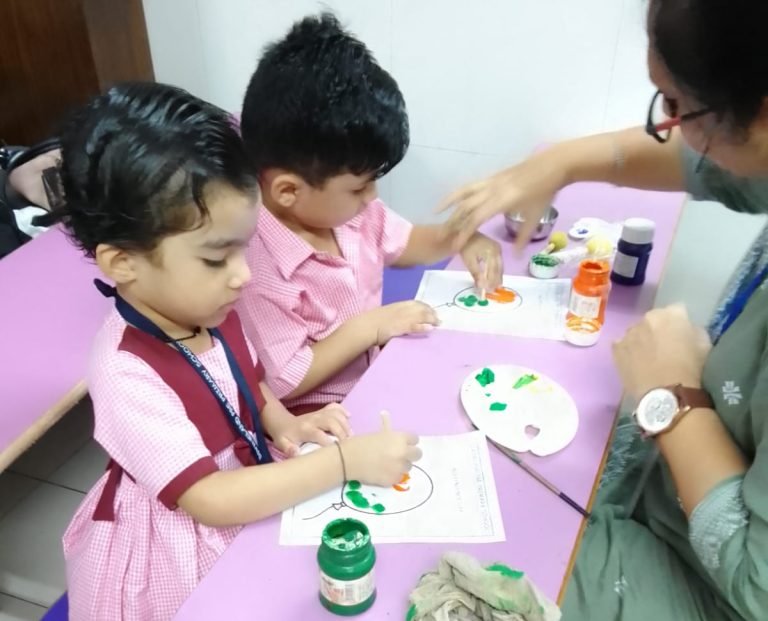
At Divineland Pre Primary School, we believe that the early years of a child’s education are crucial in setting a strong foundation for lifelong learning. Our Play Group Curriculum is meticulously designed to cater to the unique developmental needs of young children. It combines playful activities with structured learning, ensuring that each child not only enjoys their first educational experiences but also gains essential skills.
Through a blend of interactive and engaging methods, we aim to foster curiosity, creativity, and a love for learning in our youngest students. This Play Group Curriculum is the first step in their educational journey, offering a gentle introduction to the world of structured learning in a nurturing and supportive environment.
Discovering the World Through English
Alphabet Mastery
Oral Alphabet Recognition
This approach focuses on teaching the alphabet through auditory means, which is particularly beneficial for auditory learners. The key is to engage children with the sounds of each letter before they learn to recognize them visually or in written form.
Example: A teacher might start with the letter ‘A’, pronouncing its sound clearly and then associating it with words that start with ‘A’, like ‘apple’, ‘ant’, or ‘astronaut’. They might use rhymes, songs, or repetition to reinforce the sound. For instance, singing a catchy song that emphasizes the ‘A’ sound in various words can make the learning process fun and memorable.
Visual Alphabet Recognition
This method involves associating each letter of the alphabet with a corresponding image. This visual association helps children in remembering and recognizing letters. It’s particularly effective for visual learners.
Example: For the letter ‘B’, a teacher might show a picture of a ball or a book. This visual cue helps children connect the shape and sound of the letter ‘B’ with an easily recognizable object. Flashcards with letters and corresponding images are commonly used in this method. For instance, a flashcard might show a ‘C’ alongside a picture of a cat.
Introduction to Writing
Before children learn to write letters and words, they need to develop their fine motor skills and understand the basic strokes used in writing. This foundational step is crucial for building good handwriting skills.
Example: A teacher might start with simple lines and shapes. For instance, drawing straight lines, circles, and cross lines helps children understand the movements needed to form letters. Activities might include tracing these shapes or drawing them in the air with fingers. When it comes to actual letter writing, a teacher could start with letters that involve simple strokes, such as ‘L’ or ‘T’, gradually moving to more complex letters like ‘B’ or ‘S’.
Basics of Mathematics
- Numerical Recognition and Counting: Identifying and counting numbers 1 to 10, both orally and using fingers, laying the foundation for numerical understanding.
Creating General Knowledge awareness
- Understanding the World Around: Introducing children to parts of the body, common fruits, vegetables, animals, birds, colors, and community helpers.
Cultivating Creativity and Morality
- Rhymes and Fun Songs: Engaging with language through music and rhythm.
- Moral Stories with Puppets: Enhancing ethical understanding through puppet-based storytelling.
Learning new words with Actions
- Action-Based Learning: Incorporating words like stand, sit, jump, run, clap, and more into daily activities to build a robust active vocabulary.
Fostering Fine Motor Skills
- Creative Expression: Encouraging skills like scribbling with crayons, thumb and finger printing, vegetable printing, sponge dabbing, paper pasting, and clay molding.

To Download Preschool Brochure Click Here.
Feel free to Call / Whatsapp at +919082778593 / +918591021373.
Developing Gross Motor Skills
- Physical Activities: Enhancing physical development through running, ball games, jumping on trampolines, and crawling inside tunnels.
Learning to Effectively Communicate
- Starting Conversations: Focusing on self (Me) and family to develop basic conversational skills.
Integrating Fun in Learning
- Theme-Based Dress Up Events: Allowing children to express themselves and learn through themed dressing and role-play.
- Music and Dance: Merging rhythm and movement for a joyful learning experience.
Instilling Good Habits and Etiquettes
- Personal Cleanliness and Manners: Teaching the importance of personal hygiene, good manners at home and school, and general etiquettes.
Engaging in Games and Sports
- Physical and Balance Activities: Participating in flat races, catching and throwing games, balance games like book-balancing, and yoga for overall physical development.
Audio-Visual Learning Tools
- Animated Learning Aids: Utilizing animated rhymes, stories, general knowledge topics, and children’s movies for an interactive learning experience.
At Divineland Pre-Primary School, we rely on in building an atmosphere that balances learning with fun, creating love for education in early years. Our Play Group Curriculum is designed to prepare your child for the next steps in their academic journey, ensuring they have a strong base in various all necessary life skills too.
Join us in this beautiful world of preschool education, where every day your child gets new opportunities for growth, exploration, and fun!
For more details regarding admissions, Feel free to Call / Whatsapp at +919082778593 / +918591021373.
To Download Preschool Brochure Click Here.
Play Group Curriculum
FAQs
What is age to join Playgroup?
The ideal age for playgroup is typically between 1.5 to 3 years, offering an early start in socialization and foundational learning.
What do you teach play group students?
Playgroup students learn basic alphabets, numbers, motor skills, simple songs, and engage in creative and physical activities for early development.
Is playgroup necessary before nursery?
Attending playgroup before nursery is not mandatory, but it can greatly aid in a child's early socialization, learning, and developmental skills, easing the transition to nursery.


